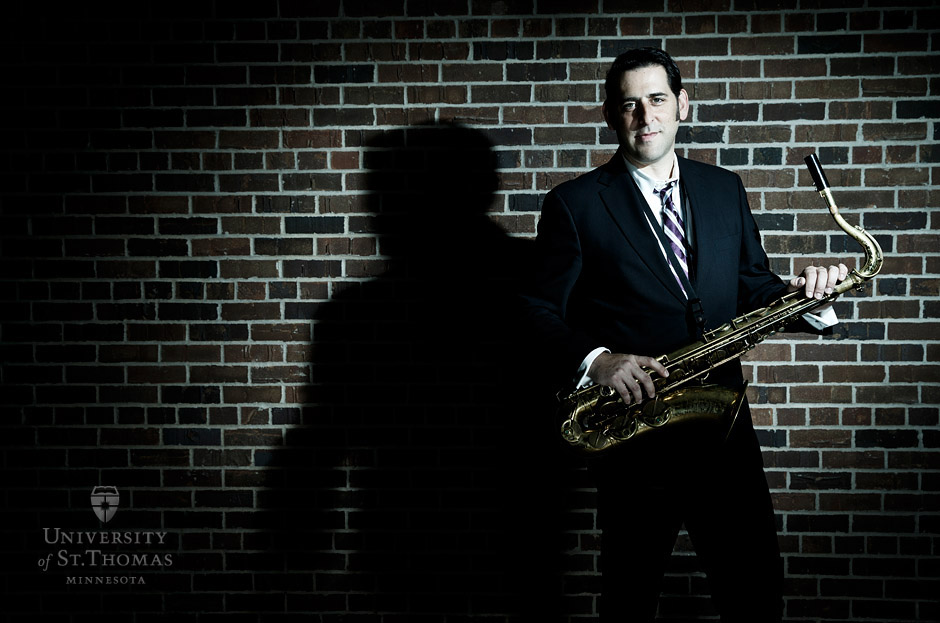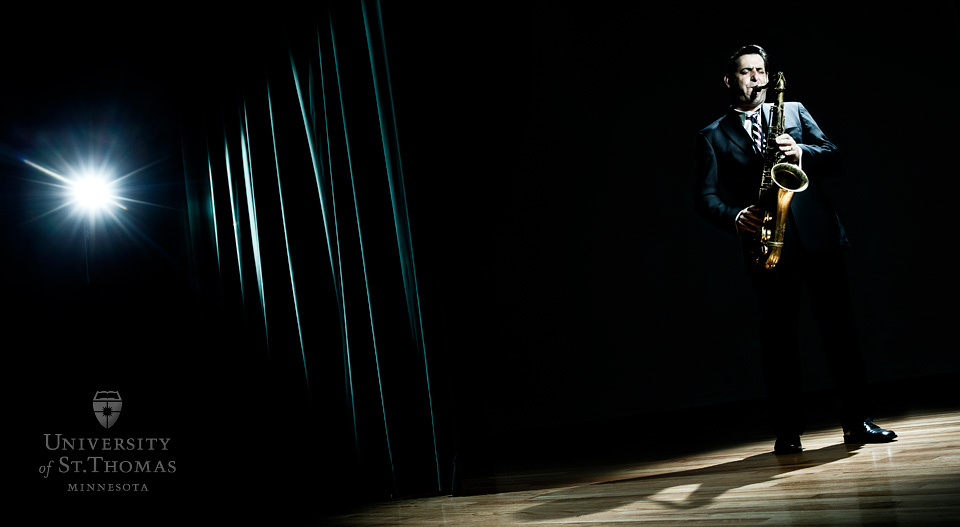In 1998 Steve Cole, a professor of music business, recording arts and popular music at St. Thomas, accomplished what few saxophone players do: he signed on as a recording artist with a major record label, Atlantic Records. That year, the label released his first album, "Stay Awhile," which churned out two No. 1 hits and peaked at number 13 on Billboard's Top Contemporary Jazz Albums list.
With his newest (and seventh) record, "Pulse," which releases this month, Cole said, "I wanted to be naive again. I tried to forget everything in the music industry that entered into my creative process and make a record that was as pure and honest as my first one."
Cole will celebrate his latest CD release with a live performance on Saturday, Nov. 16, at the Dakota Jazz Club in Minneapolis.
He recently discussed with the Newsroom his latest album, what it's really like to play the Hollywood Bowl and other tales and tribulations of a professional musician.
Tell us more about "Pulse"
I've always taken different approaches with each record. My first one was consistent with the genre. At the time I just made music that was natural. Everything was new to me. With my second album ("Between Us") I felt like I almost had too much knowledge. And there were so many people involved. I was assigned an executive producer to help select songs. … I felt like I was being "handled." They wanted me to cover "Waterfalls" by TLC, for instance. I thought it turned out decent, but I wasn't feeling it. I was just going along with what people thought was right … .
For "Pulse," I wanted to get back to that natural impulse … music that would be fun to play over and over and over. Eight of the 10 songs are original, which I co-wrote with David Mann. I cover "Ain't No Love (in the Heart of the City)" by Bobby Blue Bland and '"Going in Circles" by The Friends of Distinction. I normally think it's a cop-out to do covers, but these two I felt strongly about.
What's practice like for a professional musician?
I'm on a regimen these days, so I practice 10 to 12 hours a week. I've also recommitted myself to technique. Scales are an everyday thing. Then I move on to etudes, then repertoire, and then maybe I'll play a Charlie Parker transcription or something. I like to keep a Post-It on my computer monitor that says "ASTWO" just to remind myself that there's Always Something To Work On.
How do you break out of a composing rut?
I've had them, but I always pull it off! [Knocks on his wood desk] I also don't write all the time. I write when I have something to write for. It fits my personality. When I have a goal, I'm most creative. After you write a song, you think it's the last one you'll ever write, and you wonder, "Is there a finite amount of original music that's in somebody?" Maybe that's why I don't write all the time.
Where and when was your first big live performance?
At the Goodwill Games in Battery Park in New York City in 1998, which was also my first live performance as a recording artist (for Atlantic Records). I remember it was a pretty weird order of appearance. I played right before Tricia Yearwood. It was a very diverse lineup. There was a gigantic stage, Jumbotrons on both sides, a sea of people … . It was scary as hell. My second live show was the very next day at the Taste of Cleveland, where it seriously rained. It was a much smaller crowd. Those two days were really bizarre.
How long have you played the saxophone, and why did you choose it?
My father was a sax player, so I was around it a lot from a very young age. He and I would play this game where we would listen to records and he would ask me to name who was playing. So from a young age I learned to distinguish musicians' distinctive voices on their instruments.
I didn't get serious, though, until my freshman year in high school. I'd go through periods of being inspired or not at all, but I always had a leaning toward jazz, blues and rock. Then I found a teacher – Wayne Richards, a graduate of the Bordeaux Conservatory and Northwestern University – who inspired me to commit in a different way. It was the first time I wanted to realize what my full potential could be. But then my dad asked me what I wanted to do with my life, and I couldn't answer, so I switched from music to economics and graduated with a B.A. from Northwestern.
So how did you wind up pursuing music full time?
All the while I still played in clubs in Chicago. Right out of college I got my first job with Bain and Co./Baxter International doing management consulting in the health care industry. Then I transitioned into corporate strategy after two years with Baxter. But all this time, I'm playing more and more on weekends. It was tiring, but I got to play with some great musicians … with rock bands … . I played blues and gospel, too. So I had this job, but I didn't love it. I loved music. But I'm thinking, I don't want to quit my job. I don't know how to do that! So I went to grad school (at the University of Chicago) and got an M.B.A in economics and marketing. It actually turned out to be great, because I was already so used to multitasking that when the job went away, all I had to do was school and music. I found I had all this time. I started playing sessions for TV and radio commercials. I started playing with higher caliber musicians, and started writing and producing music for those artists. My whole musical game was raised in graduate school as far as my commitment to music, the type of music I was playing and the company I kept.
Tell us about one unforgettable tour memory
Playing the Hollywood Bowl for the first time was the most exciting. It seats 17,000. I was thinking, "The Beatles played here!" But it was also a really bizarre experience because the first few rows are seated table service – usually people in the industry who are not paying any attention to you. And the stage is in the round, so you start playing as you're being rotated in front of the audience. I just remember this spotlight in my eyes and all I could see was black, except for the first three rows of people eating and not paying attention to me. I thought it'd be incredible but it was "meh." I did get to take a walkway out into the crowd, though, so that was cool.
Do you still get stage fright?
I'm more anxious playing a club where my friends and family are than I was playing the Hollywood Bowl. Whatever anxiety I have all subsides after the first note. Then it's just fun.
Have you ever made a mistake during a performance, and, if so, how did you handle it?
A lot of times mistakes can be a fortunate thing. I had one major screw up with a full orchestra on stage and five cameras recording and filming live in front of 2,500 people. My first two songs went off without a hitch. Then I started the third song – "The Look of Love" – in the wrong key, so I stopped. I walked up to the microphone and apologized to the audience – and politely asked people to destroy their iPhone footage! I ended up getting a standing ovation. They probably thought, "This guy's a human being." They got engaged. You just need to own up to your mistakes and realize we're all in this together. The audience is not there expecting you to fail. If you're not prepared, you should be afraid. But if you are, they're going to be on your side.
Who would you most love to perform a duet or collaborate with?
Miles Davis. For a million reasons. But one is that I've performed with musicians (including bassist Richard Patterson) who have performed with Miles. What they got from him is so profound, and the mentoring I've received secondhand has been incredible. I wish I could've learned from him firsthand. I can't imagine what that would've been like.
 Any good road stories?
Any good road stories?
I do have a cool road story. I played a Raleigh, N.C., festival that had a diverse line up. The B-52s were there, and they stayed at the same hotel. A pianist friend of mine named Joe McBride started playing piano in the hotel bar sometime after the show, and the B52s were in the bar. So Fred Schneider (one of the B-52s) starts singing along to "My One and Only Love" with Joe. I thought, "I'm not letting this moment go," so I ran up to my room, grabbed my sax and played along. At some point Joe started playing "Rock Lobster," and Fred kind of rolled his eyes, but he was a good sport and sang along. The girls (Kate Pierson and Cindy Wilson) even came up and joined.
How do you celebrate the completion of a record?
Finishing a record is bittersweet. You're in a studio and this thing is taking shape, from absolute silence to this beautiful thing. So the final part of producing a record is called mastering, which is done by the engineer. It's a solitary process and not terribly exciting. It's not like you have a wrap party. I'll fly into New York, sit in a studio with the master engineer for six hours watching him put the final touches on my record, and when he's finished he'll very unceremoniously hand me a reference CD. And that's it. Then I'll usually walk across the street and have a steak and a glass wine.
What will be on your mind the day "Pulse" is released?
No matter how many times you go through this cycle, there's always the same excitement, fear and optimism. Even if you've been beat down, there's always that eyes wide open hope. Vulnerability is a hard lesson to learn. Do I hope people like it? Definitely. I don't make music to satisfy some curiosity or challenge. I want people to listen to it. The whole point is to entertain. In the final analysis, the only people who can answer to a record's success is the audience.







